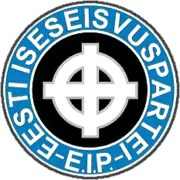Estonian Independence Party
The Estonian Independence Party (Estonian: Eesti Iseseisvuspartei, EIP) is a nationalist political party in Estonia. The party, founded in 1999, is a successor to the Estonian Future Party. One of the principal aims of the party is the withdrawal of Estonia from the European Union. The party is currently without parliamentary representation.
Estonian Independence Party Eesti Iseseisvuspartei | |
|---|---|
 | |
| Leader | Sven Sildnik |
| Founded | 30 November 1999 |
| Headquarters | Tatari tn 8-21, Tallinn |
| Membership (2020) | |
| Ideology | Estonian nationalism Hard Euroscepticism |
| Political position | Far-right |
| Colours | Blue |
| Riigikogu | 0 / 101 |
| Website | |
| www.iseseisvuspartei.ee | |
Philosophy
The EIP's political philosophy promotes a doctrine of “Estonia as a neo-autarkic geopolitical space” and an associated geopolitical imperative of neutrality between the East and the West.[1]
The party programme states that Estonia is extraordinarily rich in natural resources (much of these remain latent) and is situated in an important geopolitical space. Thus, the party is also against Estonia belonging to the European Union, which they accuse of having neocolonised Estonia. The party recommended rejecting International Monetary Fund suggestions.[2] The party regards Setomaa as a part of Estonia and not Russia.[3]
History
The party's predecessor, Estonian Future Party (Tuleviku Eesti Erakond) was founded in 1994. In 1999, it was renamed to Estonian Independence Party.
In 2001, the party called for closer relations with Russia and said that the country should have a bigger say in defining Estonia's future.[4]
EIP took part in the 2003 movement against Estonia joining the European Union.
EIP candidates gained 2,705 votes, amounting to 0.55% of the national vote, in the 2003 parliamentary election.[5] In the 2007 elections, the party's vote dropped to 1,274 votes, which was 0.2% of the total.[6] In the 2011 elections, the party's vote increased to 2,571 votes, which was 0.4% of the total.[7]
In the 2014 European Parliamentary election, the Estonian Independence Party received 4,158 votes, which was 1.3% of the vote.[8]
In the 2015 parliamentary elections, the party's vote diminished to 1,047 votes, which was 0.2% of the total.[9] The party did not participate in the 2019 parliamentary elections.[10]
Controversies
Opponents have claimed that the party is a far-right organisation. This has been rejected by the party leader, Sven Sildnik, and a leading board member, Tauno Rahnu, a Tartu Neo-Nazi.[11] One of the former leading members, Risto Teinonen, an ethnic Finn associated with Johan Bäckman,[12] has also been accused of having National Socialist views.[13]
Electoral results
See also
Notes
- Piret Ehin, Estonian Euroskepticism: A Reflection of Domestic Politics?, East European Constitutional Review, Volume 11/12 Number 4/1
- "EIP party doctrine (in English)". Archived from the original on 2012-08-03.
- Jaan Hatto demokraatiast Iseseisvuspartei. Accessed 7 June 2014
- Baltic News Service, Estonian Independence Congress Calls for Neutrality, Better Ties with Russia, Nov 5, 2001
- Riigikogu Valimine 2. Märts 2003 vvk.ee. Accessed 7 June 2014
- Riigikogu Valimine 4. Märts 2007 vvk.ee. Accessed 7 June 2014
- Valimistulemus - Eesti Vabariik kokku vvk.ee. Accessed 7 June 2014
- "Voting and election results". Estonian National Electoral Committee. 26 May 2014. Retrieved 7 June 2014.
- "Riigikogu valimised 2015". Vabariigi Valimiskomisjon. Retrieved 8 March 2015.
- "Voting and election result". Vabariigi Valimiskomisjon. Retrieved 2 January 2020.
- Tartus rünnati mustanahalist vahetusüliõpilast
- Askur Alas (18 March 2009). "Üheskoos Eesti vastu: antifašist Bäckman ja natsimeelne Teinonen". Eesti Ekspress (in Estonian). Archived from the original on 21 March 2009. Retrieved 31 March 2009.
- Kapo kahtlustab soomlast Eesti riigi vastases tegevuses Archived 2011-02-07 at the Wayback Machine Eesti Päevaleht, 2007-6-13.